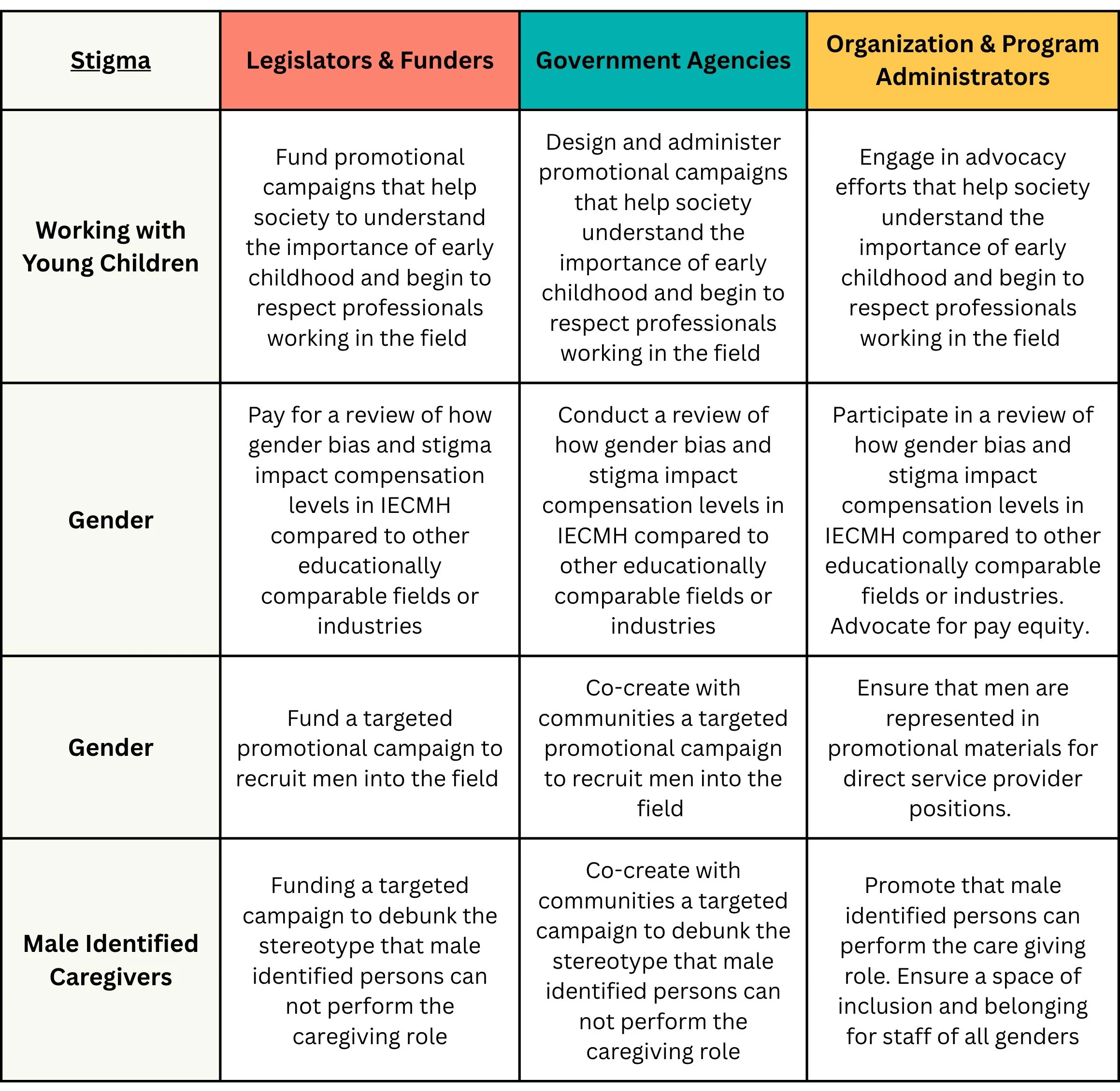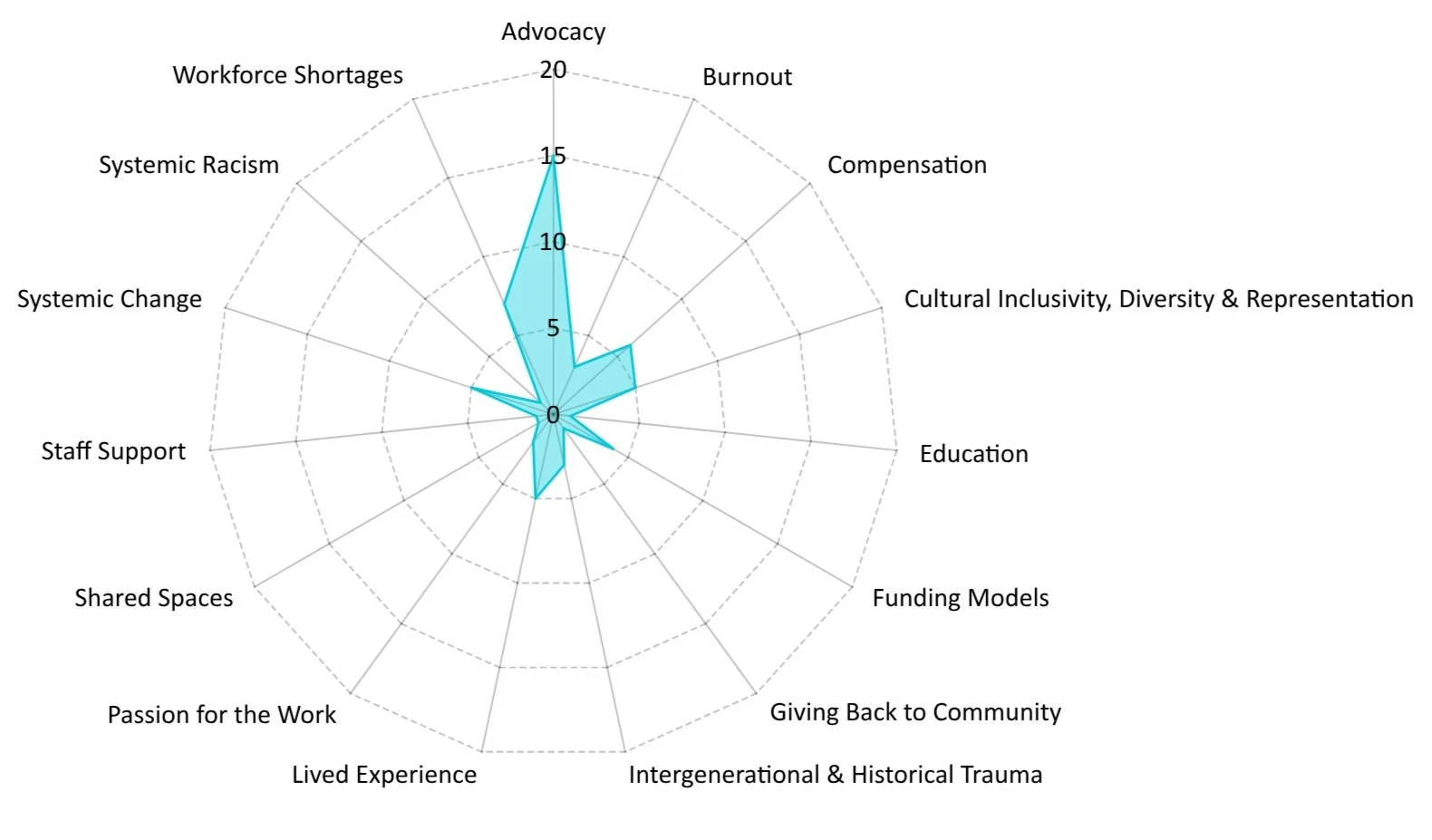
Stigma
Many people reported feeling stigma in their jobs, where they were unfairly looked down upon or treated poorly because of societal misconceptions.
-
Many providers said that working with young children is not always seen as an important job. People often think it’s easy and that anyone can do it. They don’t understand how much training, learning, and care it takes to do this work well. A lot of providers said they are often called babysitters, which makes them feel like their work isn’t respected.
A DIRET SERVICE PROVIDER’S PERSPECTIVE
“We love our jobs, but people who aren’t in the field don’t really understand, don’t know about it, and don’t value it. Some people tell me that I’m a babysitter, but we do more than that, right?!”
AN ADMINISTRATOR’S PERSPECTIVE
“People don't think that we're serious when we go to families with toys and books.”
-
The field of Infant and Early Childhood Mental Health (IECMH) is predominantly female, resulting in a lack of gender diversity and reinforcing the perception that caregiving is primarily a woman’s role, especially among direct service providers. Male providers shared stories about being viewed as less nurturing in personal and professional settings, reinforcing the belief that caregiving isn’t a role suited for men. This misconception not only discourages them and other potential male providers from participating in supporting young children and families but also overlooks the valuable skills and perspectives they bring.
In addition, gender inequality around pay reinforces this idea. In the past, women were expected to take care of others at home without getting paid. As a result, jobs that are part of the caring profession often have low wages compared to other industries. The low pay is one reason that has kept men from joining the field.AN ADMINISTRATOR’S PERSPECTIVE
“As white males with a lot of privilege coming into this space that's typically female-dominated, there could be the perception that "Oh, see now, white men are taking over this space too, and the patriarchy is gonna take control over an area that was typically a woman's domain." - From a direct service provider
A DIRECT SERVICE PROVIDER’S PERSPECTIVE
“I sat in multiple interviews where it struck me...I oftentimes would hear men say, "Well, I'm responsible for my family, and so I need to make more money than that" and I just kind of sat there thinking "I'm responsible for my family, too." - From an administrator focus group participant
-
People also talked about the belief—sometimes said out loud, sometimes not—that men aren’t as good at caring for children as moms or other women. This belief makes it harder for everyone doing this work to support families. It also makes it tough for men to be trusted and taken seriously in their jobs. Many men said they keep doing this work because they want to help change these unfair ideas.
PERSPECTIVE OF DIRECT SERVICE PROVIDERS
“One of the myths that gets perpetuated is, "Well, you're the father. There's really nothing for you to do with the infant, because all they do is eat, sleep, poop, and play." It is important to dispel that myth. I still have dads that come into the prenatal class that say, "Oh, I was told that there's really nothing for me to do."
"I also stay in the field because I believe parenting is from both parents, not only from moms. I have worked with daddies but usually it is the mom who sees us. Mom is the one who has the heaviest weight in the family, and the father provides shelter, food, and so forth. The father is not interacting. The father is absent."
Sub-topics
There were three types of stigma that were identified which are listed below. Click on the arrow next to each topic to learn more and read quotes.
Call to Action
The focus groups brainstormed several actions those with authority and influence within the IECMH system can take to address Stigma. Below are some suggestions, organized by specific roles.
Do you have additional ideas on how to to address Stigma? Click here to download a blank template and track your actions!
Connection to Other Topics
The chart below shows how Stigma is connected to other topics. The numbers show how often the topics were discussed together.


